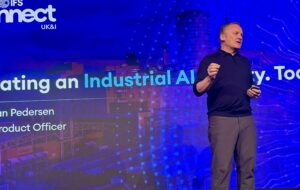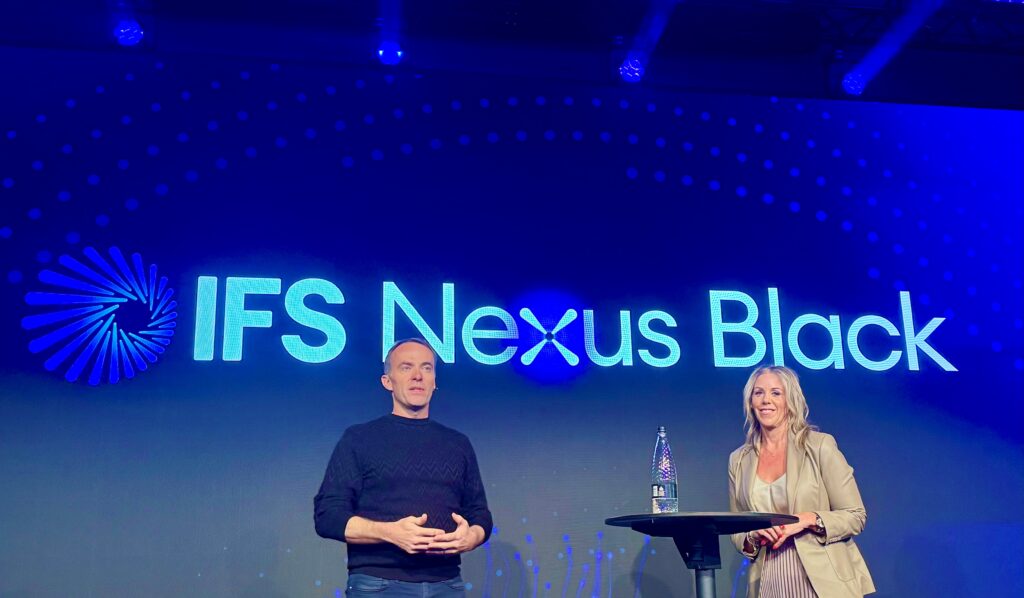At IFS Connect UKI 2025 in Birmingham—the heart of Britain’s industrial heritage—Christian Pedersen, Chief Product Officer and James Greaves, Global Head of Presales didn’t mince words: AI is no longer a feature. It’s the new foundation. What unfolded on stage was not another cloud pitch or AI prototype showcase—it was a compelling vision of how IFS is reshaping enterprise software around the realities of industrial businesses, down to every last work ord er, turbine inspection, and supplier email.
er, turbine inspection, and supplier email.
“Industrial AI is not about prompt engineering,” said Pedersen. “It’s about embedded intelligence, in context, working for your users—24/7.” Greaves echoed this with a live demo that juxtaposed ChatGPT’s limitations with IFS.ai’s task-specific precision. In one compelling moment, an agent automatically read a third-party inspection report, generated work orders, prioritized them based on asset condition and language cues, and updated the ERP—no human intervention required.
This, Pedersen stressed, is not a beta test. “Everything you’ve seen today is live, available in IFS Cloud 24R1, and it’s already embedded across the suite.”
At the core of IFS’s approach is a layered architecture built around a proprietary platform, IFS.ai. It includes:
- Data Services for structured, unstructured, third-party, and streaming data
- AI Services for prediction, summarization, classification, and generation
- Governance & Orchestration for safe, compliant execution at enterprise scale
Agents and copilots are no longer add-ons—they are digital workers that operate side-by-side with humans, feeding on real-time data, making decisions, and executing tasks. And thanks to a one-to-one pairing between each customer’s IFS Cloud environment and their private IFS.ai tenant, Pedersen confirmed, “your data is your data—never used to train our models.”
Perhaps the boldest statement from the keynote: “You don’t buy an IFS AI product. You get AI as part of everything we do.”
 That’s not just a philosophical stance—it’s strategic. More than 200 AI-powered capabilities are now live in IFS Cloud, from predictive invoice payments to generative maintenance planning and image-based document ingestion. Industrial users can interact with copilots across Teams, mobile apps, or native IFS screens—and even issue verbal commands to update schedules, trigger RFQs, or escalate inspections.
That’s not just a philosophical stance—it’s strategic. More than 200 AI-powered capabilities are now live in IFS Cloud, from predictive invoice payments to generative maintenance planning and image-based document ingestion. Industrial users can interact with copilots across Teams, mobile apps, or native IFS screens—and even issue verbal commands to update schedules, trigger RFQs, or escalate inspections.
Crucially, IFS has now made all these features available even to remote deployments, eliminating a previous requirement to be hosted in IFS’s Industrial Cloud. “We’ve refreshed the Industrial Cloud Service with more flexibility and pricing agility,” Greaves said. “But if you’re not on IFS Cloud, you need to get there—now.”
What this means for ERP insiders
Establish a firm cloud foundation. Manufacturers, utilities, A&D, telcos, service, and construction firms should prioritize migrating to IFS Cloud—not simply for modernization, but to activate embedded AI capabilities that directly impact field operations, supplier coordination, asset reliability, and workforce agility. Use the IFS.ai Activation App to identify quick-win use cases, like AI-based scheduling or procurement agent automation. Then, treat data quality as a strategic enabler: align master data, codify tribal knowledge, and validate system dependencies. Start small, scale fast, and train cross-functional teams to embrace digital workers as collaborators—not replacements—in the next phase of operational excellence.
Understand the role of IFS.ai. IFS.ai is not a bolt-on—it’s a vertically integrated, industry-aware AI layer that differentiates IFS from generalist ERP providers. Its agents interact with live ERP processes in real time, using a customer’s private data and permissions to recommend or automate decisions. Unlike consumer AI tools, IFS copilots are pre-contextualized, removing the guesswork from queries. With over 200 embedded capabilities—from work order generation to supplier evaluation and inspection remediation—IFS is delivering enterprise AI where it matters: directly in the workflows that generate revenue, manage risk, and ensure compliance.
Odds are in IFS’s favor. The $60B industrial ERP market is accelerating toward AI-native platforms. IFS’s ability to deliver industry-specific, embedded intelligence—without fragmenting the user experience—is a major differentiator. Competitors like SAP and Oracle are rapidly developing similar capabilities, but IFS’s unified platform, open APIs, and proven PSO (Planning and Scheduling Optimization) history give it an execution edge. If IFS maintains product velocity, sustains customer intimacy, and scales its cloud base globally, it stands a credible chance of becoming the industrial ERP market leader by 2029. But that path requires relentless focus—and a partner ecosystem ready to match its ambition.






